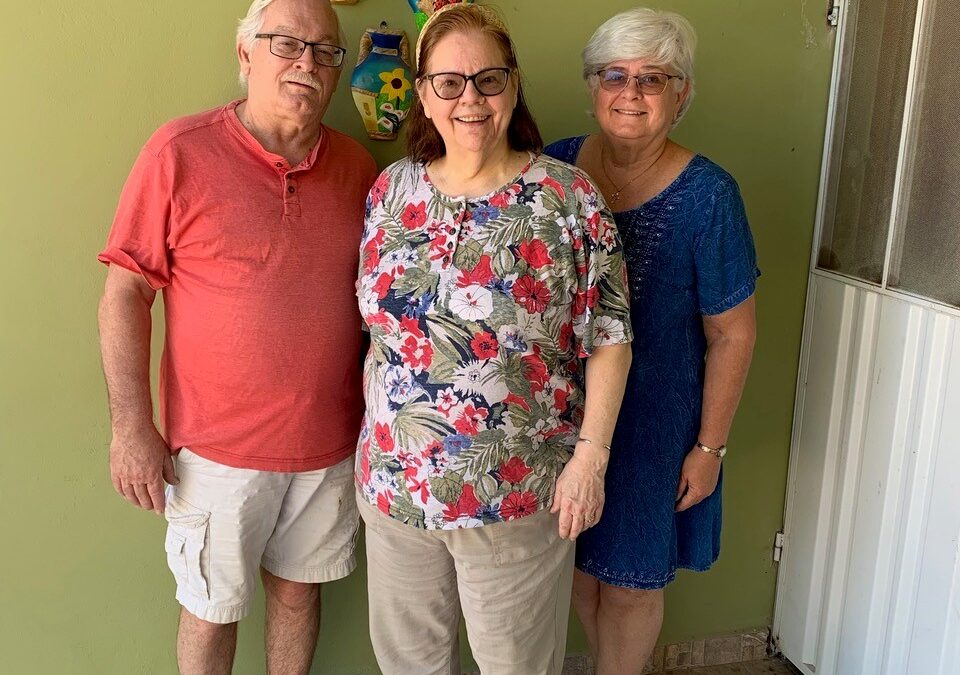
by Brendan Kimbrough | Mar 11, 2025 | Honduras, SAMS Missionaries
by Susan Park, SAMS Associate Missisonary
Our plane leaving Pittsburgh was delayed about half and hour while they de-iced it. When we arrived in San Pedro Sula it was 90º! Talk about extremes!
So much has changed since we lived there. We discovered that now to fill out the customs form, you have to do it with a QR code on your phone. (Cell phones are everywhere now.) We walked right past the posters so the fellow who was helping us, did it with his phone for us. When all eight suitcases and backpacks went through their x-ray machine, they pulled aside the big black one. “What is this?” “It’s a donated used sewing machine. It’s going to a workshop for poor women in the capital to learn a trade. And there’s another one in that suitcase.” And I handed him the letters from the workshops explaining that they were all donations. I was praying that he didn’t want to open the machine case itself as it was stuffed full of thread in all the spare spaces, which would have spilled all over the place. Praise God, they didn’t open any of the others and let us go without having to pay any duty on what we brought in.

Not having gone to bed the night before because the shuttle picked us up at 3 AM, we took naps until dinner time. Bp. Lloyd Allen met us and we got caught up on what has been happening in the diocese and the plans for the workshop that John and he would be teaching with the new deacons and those who are pursuing the permanent diaconate.
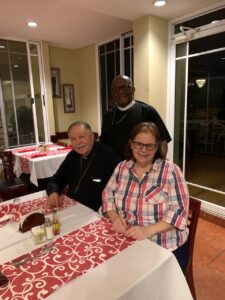
Up at 6 the next morning to head to Tegucigalpa the capital where I would see the workshops and drop off the machines and supplies. Bishop Lloyd sent me in a church van with a driver to help with the two suitcases, a sewing machine, and my backpack so that I didn’t have take a bus. About 6 hours later, after trying to follow GPS and getting vaguely lost, we arrived at the Jericho workshop and school where we dropped off the first machine and met Noah (son of former SAMS Missionary Betsy Hake) who introduced us to the women in charge of the workshop. We unpacked the very full, very heavy suitcase with the sewing machine and materials. Noah showed me around the school as well and introduced me to some children from an outreach project they have. Unfortunately, I was not able to meet with Betsy as she was away on a much-needed sabbatical. The Jericho Villa where Betsy lives and has the children’s home and another school is several hours further away out in the countryside, so I was not able to go there. The far photo has some of the items that are for sale made in their workshop.
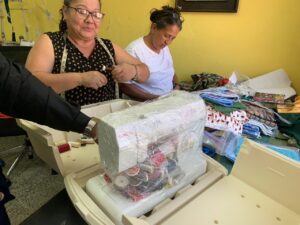
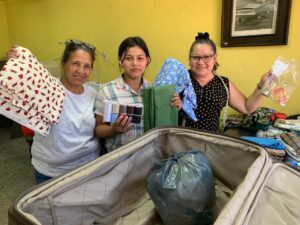
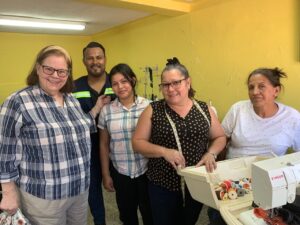
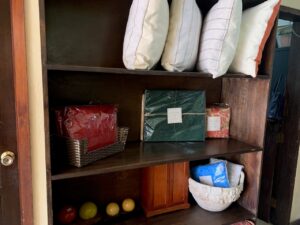
Then onto LAMB Institute where I would stay with SAMS missionaries, Steve & Debbie Buckner. LAMB was founded almost 25 years ago by former SAMS Missionary Suzy McCall as the Latin American Mission and Bible School to train Hondurans in discipleship and as missionaries. Now the program focuses on children who have been abandoned. The youngest is only 6 months old. When they turn 18, the government regulations state they must move out, so they have established a transition house where they live and help them finish schooling to be able to get a job. Their recent project is a home for those who will not be able to live on their own; 2 children who are blind, 2 with cerebral palsy, and 4 others with mental health and behavioral issues. They also have a school on the campus and another in the village down the road. They have a farm where they raise a lot of their own food, as well as chickens and sheep.
This is Alexi, who was my driver, with the sheep eating sugar cane
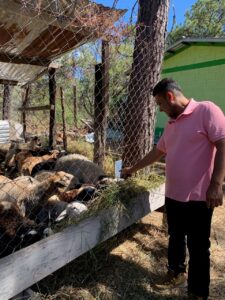
The other man with the chickens is Ariel who works the farm.
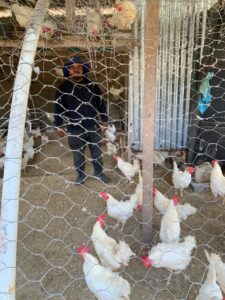
The children are encouraged to help as well.
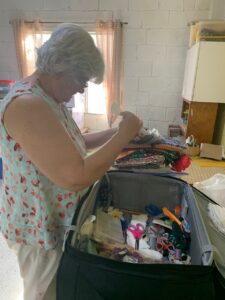
Debby unpacking the supplies
Debby was delighted to get the sewing machine and supplies as she teaches all kinds of handcrafts with the girls. You can see the pile of fabric as well as the supplies in the suitcase. It was stuffed full as was the sewing machine case. Steve teaches wood working, helping them learn about tools and how to use them. They have a store that’s in an old school bus. When the crafts are sold, a tithe goes to the church and some money goes to cover the use of the tools or the supplies and some money goes into a savings account for the children which is theirs when they turn 18.
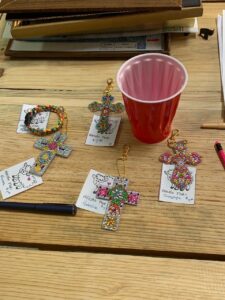
Crosses that the girls made with “diamond dots”
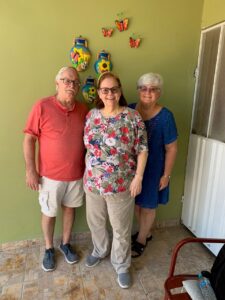
Steve, Debby and me.
As is often the case, there was a misunderstanding. Alexi, my driver, didn’t have family there to stay with. Praise God, Steve knew of a hotel they had used for groups that was close by their house. But it took only cash, so we went in search of an ATM 20 minutes away. The first one kept rejecting my cards, only to find that it was broken. The fellow outside the Municipal building told us where to find another one, which thankfully was just down the road. Success! Back to the hotel to pay for the room, only to find that the owner wasn’t there, only a security guard who didn’t have change for L/.500 bills. So I gave him most of the money, gave more to Alexi and told him to go buy breakfast in the morning so we could break the bill and pay the rest that we owed. Well, Alexi was the only one staying there and the guard wanted to go home, so he just gave Alexi the key to the gate so he could come back in after he left for dinner.
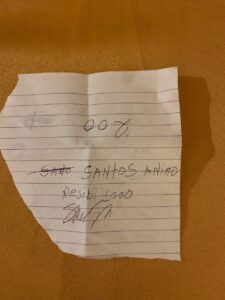
This was a receipt for the money I gave him; a corner torn out of a book.
Saturday morning, Steve took us around and showed us the children, the farm, and the buildings. It is amazing what God has done in such a short period of time. Then we took off back to San Pedro Sula, another 6 hour ride. I was glad to get back to the hotel and rest.
Thank you all for your prayers. The next letter will cover what John is doing.
To learn more about John and Susan Park and their ministry please visit this page.
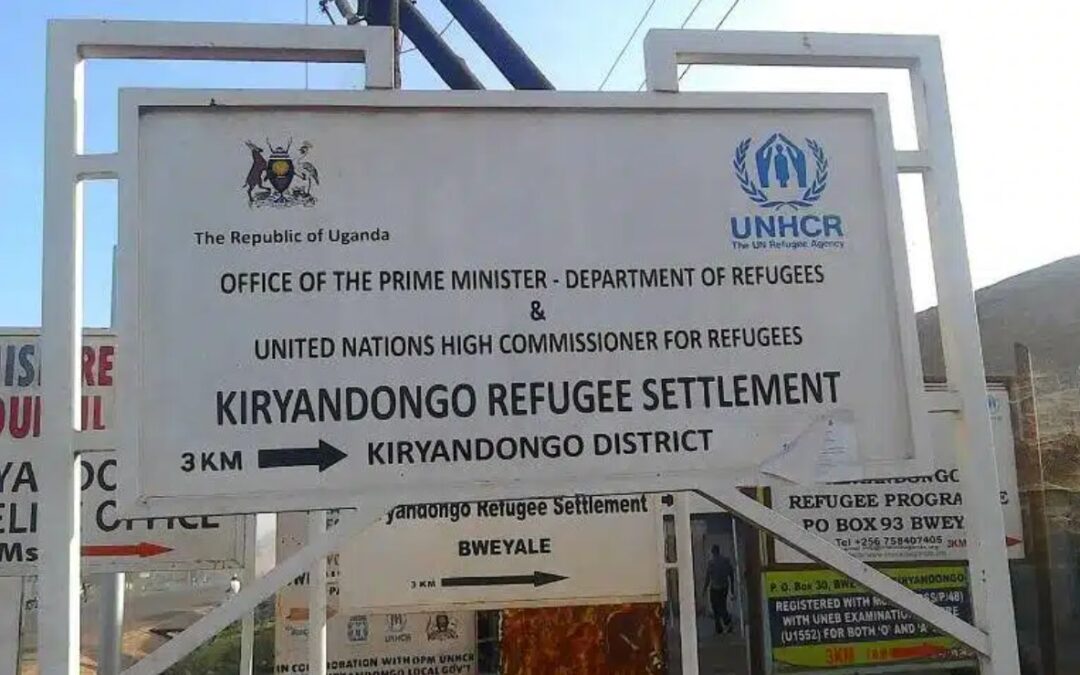
by Brendan Kimbrough | Feb 28, 2025 | Refugee Ministry, SAMS Missionaries, Uganda
It’s a dusty, jaw-rattling, two-hour drive over rough Ugandan roads to get to the Kiryandongo Refugee Camp in northern Uganda. SAMS Missionary Cathy Clevenger and her team make the drive once or twice a month to minister to groups of refugees living there, but wisely, not during the weekly food distribution. The camp is a city in its own right. A sprawling sea of homes spread out for miles, which include schools, churches, make-shift shops, U.N. health clinics, and the requisite food distribution points. It’s comprised of nearly 100,000 people, who represent just a portion of the fallout in terms of the real human cost caused by the carnage of civil war and continuing tribal conflict in South Sudan and Sudan.
One of the stark realities, besides the sheer size of the humanitarian dilemma here, is the excruciating trauma. “The majority of the population in the camp is women and children” says Cathy. “Most of the Sudanese men have either been killed or remained behind in their tribal areas to fight. The stories are real, yet always heartbreaking. So much violence, displacement, killing, and loss of loved ones has taken place.”
It could be overwhelming to confront such a human tragedy, but Cathy’s well-trained team faces it head-on in the hope and the power of the Gospel. Cathy draws on decades of experience treating trauma as a licensed social worker in the U.S. before the Lord called her to East Africa. In her current role as Counseling Coordinator for the Diocese of Masindi-Kitara, Cathy had been treating Ugandan teenagers at a local remand home for incarcerated young boys awaiting court dates. Cathy still carries out that important work, while ministering to the burgeoning refugee population and their dilemma that God had placed in front of her in late 2023.
With the scale of suffering that exists at the Kiryandongo Camp, one question arises: How can this many people possibly be treated who have experienced such terrible things? Much of the answer lies in the power of the Gospel, not only to open up people to understand their own response to trauma and begin to heal, but then to also trust that those same people will take what they’ve learned to others. It’s a replicative model of treatment that by God’s grace makes use of Scripture, small groups and guided teaching.
 Cathy and her team typically speak to an assembled group from churches within the camp about trauma and teach them what trauma looks like, what the responses to it typically are, and why people respond the way they do. They use the story of Elijah and the dramatic showdown on Mount Carmel where Elijah successfully demonstrates the power of God over Baal, which prompts Queen Jezebel to threaten to kill him, creating intense fear and a desperate flight for his life (one of the four main responses to trauma). God intervenes with the appearance of an angel who provides for him. Elijah reaches Horeb where he encounters the still small voice of God which reassures him of his purpose and gives him new instructions.
Cathy and her team typically speak to an assembled group from churches within the camp about trauma and teach them what trauma looks like, what the responses to it typically are, and why people respond the way they do. They use the story of Elijah and the dramatic showdown on Mount Carmel where Elijah successfully demonstrates the power of God over Baal, which prompts Queen Jezebel to threaten to kill him, creating intense fear and a desperate flight for his life (one of the four main responses to trauma). God intervenes with the appearance of an angel who provides for him. Elijah reaches Horeb where he encounters the still small voice of God which reassures him of his purpose and gives him new instructions.
Not only does the story reveal the vulnerability of God’s own prophet, but it shows the reality of living as a Christian; that strong belief can be severely tested by acute suffering, and that turning to God for renewal again and again is vital, especially in times of crisis. The teaching is designed to show camp participants how they can also use this teaching with others within the camp. This ‘teaching plus training’ approach is designed so that the refugees can use it within their own churches inside the camp as they recognize those who have symptoms of trauma. After the group teaching, small group work is done where one-on-one therapy is held.
Cathy says, “We offer hope and we see real deliverance from the loss of it. We don’t have food, or clothes, or other assistance to give them. We offer something far better. We offer them Jesus, his healing, and his transforming love. The Gospel promise of real and lasting restoration through healing is at work here among a people who have lost everything.”

by Lee Nelson | Feb 26, 2025 | SAMS Missionaries
Jesus said to them again, “Peace be with you. As the Father has sent me, even so I am sending you.” (John 20:21)
The idea of mission is not an exclusively Christian term. Corporations have mission statements. Astronauts are given missions. In one of my favorite movies, two bluesmen set out on a “mission from God” to save their childhood orphanage. The word is a Latin one, missio, and simply means “to send.” So, when Latin translators of the New Testament set out to translate passages like the one above, the choice required very little thought: missio.
It is from this simple, probably mindless choice in translation that we get the whole concept of mission. It is simply to say that we Christians understand ourselves to be a sent people, a people on the move. The Apostles understood that if they were anything, they were men who had been sent out – to Judea, Samaria, and to the ends of the earth. (Acts 1:8) If you track the story of the Acts of the Apostles, this is exactly what happens. On the day of Pentecost, the apostles are driven by the Holy Spirit out of the room where they were staying and the Gospel is proclaimed to Jews from all over the world. At the end of Acts, Paul and his party have come to Rome in chains. How did these early missionaries think about themselves? The answer, I think, comes in the Gospel of John. On the very day Jesus is raised from the dead, he appears among the disciples and offers a very Jewish greeting: “Peace be with you.” This is not all he says. The Lord could have simply said “I am sending you,” but in addition to giving them a mission, he makes it clear how and by what power they are sent.
“As the Father has sent me.”
Another way to put this phrase could be something like “In the same way as the Father has sent me.” And how has the Lord Jesus been sent by the Father? Several things can be said about this, but let’s start with the immediate. The immediate sending, which the disciples would have been perplexed by, was this astonishing presence of their Lord among them when three days before, he had been brutally disfigured, crucified, and laid in a tomb. Friends, this is the power, the nuclear engine, behind the Church’s mission in the world, the same power which raised Jesus from the dead. The mission of the Church is fueled by the astonishing and miraculous work of the Holy Spirit. The disciples are sent, to put it simply, as a Resurrected Body into the world. This is the nature of the Church, being the body of all those who have been baptized, buried with Christ, and raised with him to eternal life. (Romans 6)
Consider another angle. Jesus is sent not only by the power of the Holy Spirit, but as God and Man in one divine person. He is not sent as an idea, or an invisible spirit, or just a human being. The eternal Word of the Father is sent in the flesh. And the apostles are sent in the same way. I heard recently of a Christian who was setting out to plant a church entirely online. While I’m sure his intentions are good, this is not mission according to the mission of Jesus. The Apostles understood that they could not just send a letter and be done with it. They had to go in person.
But, there is so much more, consider what Jesus was sent to do! To heal the sick, to drive out demons, and proclaim the Kingdom of God! In this time, people were very aware that Caesar Augustus had proclaimed his own rule with supposed miracles. Therefore they understood that for Jesus to go around proclaiming a kingdom and healing the sick was nothing less than a challenge to the status quo of the empire. While making no violent or existential threat to the empire, it is a serious challenge nonetheless, serious enough that he was crucified for the crime of insurrection. In every age, missionaries have been sent, not to overthrow governments, but to proclaim the kingdom of God while simultaneously feeing the hungry and healing the sick, often in miraculous ways.
The bigger idea that I want you to get is this: that Jesus is sending out his Church on mission as the continuation of His incarnate body on Earth. This is why Paul writes “You are the body of Christ.” (1 Corinthians 12:27) The Church is that body which proclaims the Gospel of the Kingdom and participates sacramentally in the Lord’s incarnate body. The ancient Church understood, as we do today, that the fuel for mission is the very indwelling of human life by the Holy Spirit, nourished by participation in the Eucharist, and all of this “for the life of the world.” For this reason, we can say with confidence that every Christian, no matter where they are or what they do for a living, is a missionary. The existence of so-called missionaries only reenforces the point: the particular subsists in the whole.
As the Church is sent out into the world, her aim is no different from that of her Lord: to love and save lost humanity. I can think of no better mission statement.
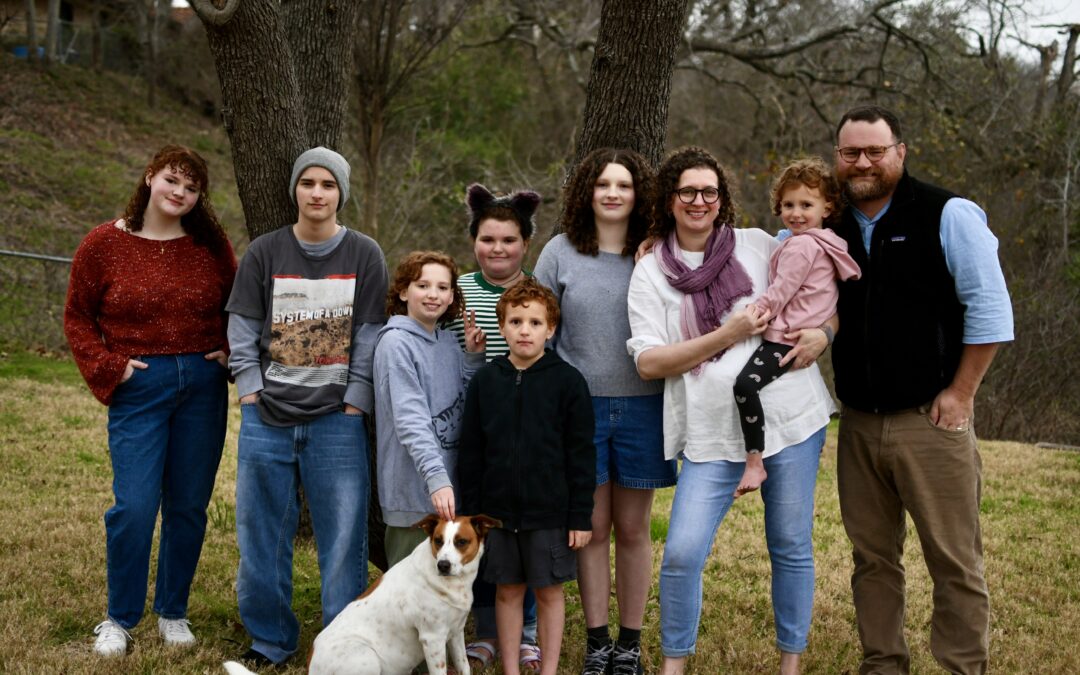
by Brendan Kimbrough | Feb 21, 2025 | Europe, SAMS Missionaries
New SAMS Missionary Candidates Lee and Ela Nelson are responding to a call to contribute to the re-evangelization of Europe through the Knüll Camp and Conference Center in Schwarzenborn, Germany. Two ACNA jurisdictions will come alongside Lee and Ela and their children for a collaborative sending effort. Both the Reformed Episcopal Church (REC) Board of Foreign Missions and the Diocese of the Fort Worth are engaged in directly supporting and encouraging others to join this ministry as Senders of the Nelson family.
For five decades REC Bishop Gerhard Meyer with his wife Grace led the Camp, where many have been blessed in the Lord. As the new director, Lee will be developing a training center to encourage the planting of healthy, multiplying churches throughout Europe.
While work needs to be done to upgrade the camp, Lee and Ela envision it as a strategic place to launch initiatives like the training center. A second focus will be to make the camp a hospitable refuge for beleaguered Christians, lay and clergy alike. Please pray for the Nelson family as they seek Senders and then transition
from Texas to Germany to equip and refresh the church.
Visit the Nelson’s page
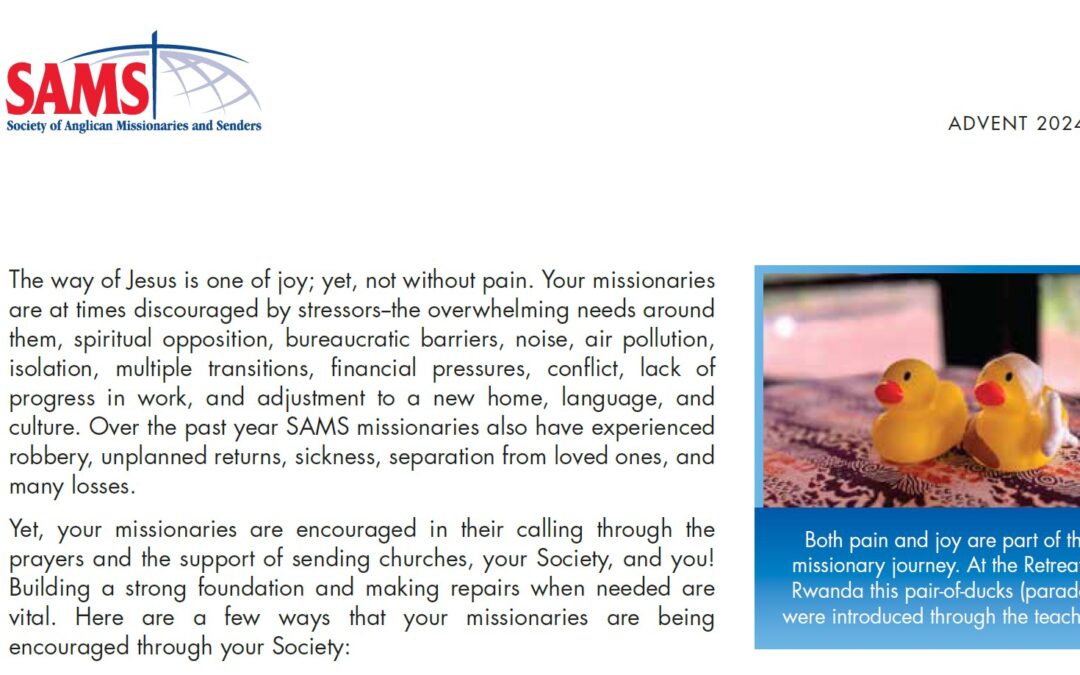
by Brendan Kimbrough | Dec 28, 2024 | SAMS Missionaries

by Brendan Kimbrough | Nov 5, 2024 | SAMS Missionaries
EXPLORE CROSS-CULTURAL MINISTRY
Discern your talents and vocational calling
ZOOM EVENT
TUESDAY, NOVEMBER 12th at 8:00PM ET
The Anglican Church is rapidly expanding, especially in the Global South, and SAMS is meeting this demand head-on with a range of opportunities for cross-cultural service in the many countries where the church is present. We partner with dioceses and parishes who know the cultural context and we work to walk alongside those who are discerning a call to help clarify and guide.
You’ll hear from SAMS Mission Directors and five different SAMS Missionaries about the present landscape internationally and domestically for long-term and short-term service opportunities. Learn how you might serve the global church in theological education, teaching, outreach to refugees and more, and why cross-cultural service is so exciting and fulfilling.
TO ATTEND: Contact Nita via email at info@sams-usa.org and request the Zoom link
You will have the opportunity to hear from SAMS missionaries about their experiences serving both in the U.S. and globally. They will be available to answer your questions.
Hosted by:
Stewart Wicker – SAMS President and Mission Director
Denise Cox – Associate Mission Director
SAMS Missionaries
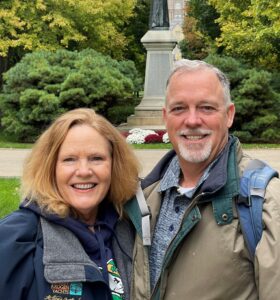
Bishop Todd and Patsy McGregor – Todd is a SAMS Missionary Coach and spent years serving as a missionary throughout Africa.
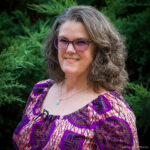
Rev. Jessica Hughes – Jessica has experience serving in theological education in Uganda.
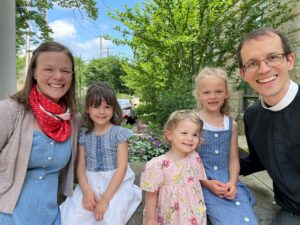
Rev. Daniel and Rebecca Behrens – Daniel and Rebecca minister among refugees and recent immigrants in Pittsburgh.
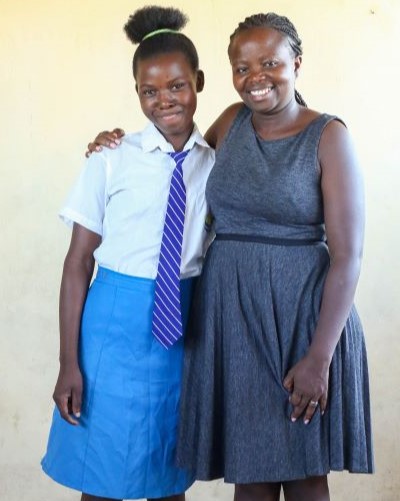
Lucy Chaves – Lucy overseas the SAMS Bridger Program, a short-term intern service program. She mentors youth in Kenya through her ministry, Kenya Connection, encouraging them to be Godly leaders.
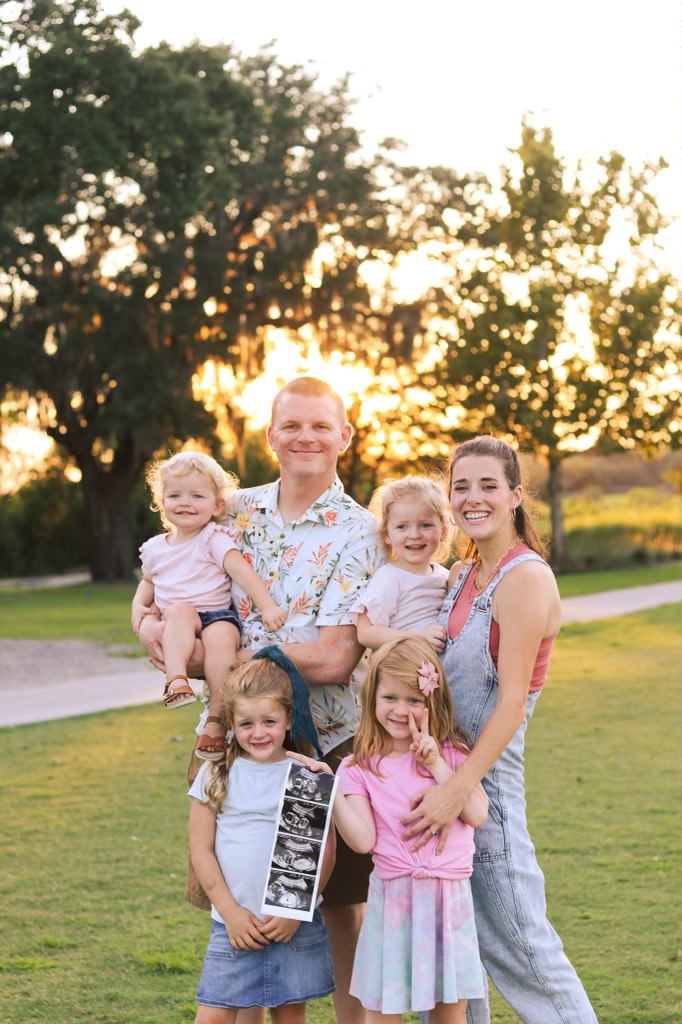
Anthony and Anna Pelloni – The Pellonis serve in Cambodia helping to disciple young Cambodians are helping to plant a new Cambodian church.
TO ATTEND: Contact Nita via email at info@sams-usa.org and request the Zoom link
















 Cathy and her team typically speak to an assembled group from churches within the camp about trauma and teach them what trauma looks like, what the responses to it typically are, and why people respond the way they do. They use the story of Elijah and the dramatic showdown on Mount Carmel where Elijah successfully demonstrates the power of God over Baal, which prompts Queen Jezebel to threaten to kill him, creating intense fear and a desperate flight for his life (one of the four main responses to trauma). God intervenes with the appearance of an angel who provides for him. Elijah reaches Horeb where he encounters the still small voice of God which reassures him of his purpose and gives him new instructions.
Cathy and her team typically speak to an assembled group from churches within the camp about trauma and teach them what trauma looks like, what the responses to it typically are, and why people respond the way they do. They use the story of Elijah and the dramatic showdown on Mount Carmel where Elijah successfully demonstrates the power of God over Baal, which prompts Queen Jezebel to threaten to kill him, creating intense fear and a desperate flight for his life (one of the four main responses to trauma). God intervenes with the appearance of an angel who provides for him. Elijah reaches Horeb where he encounters the still small voice of God which reassures him of his purpose and gives him new instructions.







